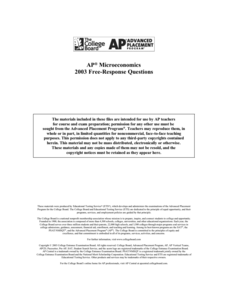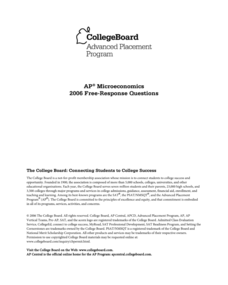College Board
2003 AP® Microeconomics Free-Response Questions
A company producing smoke alarms has a monopoly. However, what factors influence its profit and production? A series of prompts from College Board asks learners to consider the impact. Other practice problems include examining what...
College Board
2004 AP® Microeconomics Free-Response Questions Form B
A company enjoys a monopoly. What happens to its profits when another firm introduces a similar product? Learners consider the case using questions from College Board. Other prompts include the effects of sales taxes and supply and...
College Board
2005 AP® Microeconomics Free-Response Questions Form B
A rabies vaccine company has a monopoly, but fluctuations in wages are impacting its profits. A series of questions from College Board considers the problem. Other practice questions include an examination of price and output curves and...
College Board
2005 AP® Microeconomics Free-Response Questions
Consumer income drives consumer demand. A set of problems explores what happens to a dairy business when consumers all of a sudden don't have as much money to spend on milk. Other prompts from College Board examine supply and demand...
US National Archives
WWII: Asia 1939-45 – Burma
Because World War II encompassed most of the globe in one way or another, many pivotal battles and events are not as visible in the history books, leaving veterans of these conflicts feeling overlooked by more famous skirmishes. High...
US National Archives
Eastern Europe 1939-45 — Stalingrad
Acts of civilian courage in Great Britain—and in one case, the island of Malta—often receive the George Cross, instituted by King George VI at the beginning of World War II. After the valiant defense of Stalingrad by its inhabitants,...
US National Archives
Eastern Europe 1939-45 — Ukraine
Was Joseph Stalin desperate or exaggerating the USSR's need for assistance on the Eastern Front in 1942? History students examine two differing opinions on Stalin's position and the reality of the Eastern Front just three years before...
US National Archives
Eastern Europe 1939-45 — Camps
Britain's decision not to bomb German death camps in World War II has provided many questions for historians, but with a primary source analysis lesson, high school students may be a step closer to finding out the truth. Learners read...
US National Archives
Eastern Europe 1939-45 — Berlin
The inevitability of World War II has arrived: Berlin has fallen. Young historians watch contemporaneous footage of the event, analyze primary source documents, and write a news report that details the roles of the Soviet, British,...
College Board
2004 AP® Microeconomics Free-Response Questions
All goods have a social cost. A set of questions considers how to best calculate the impact the production of goods has on society. Other practice problems from College Board consider supply-and-demand curves and the impact of licensing...
College Board
2006 AP® Microeconomics Free-Response Questions Form B
What effect could a break-through device have on company's profits? A set of prompts from College Board explores just that question. Other questions consider the role of wages in profit and what factors affect the supply and demand of...
US National Archives
WWII: Western Europe 1939-45 – End of the War
You are Winston Churchill, and on May 9th, 1945, you receive millions of grateful cards and telegrams. How do you respond? High schoolers put themselves in the Prime Minister's chair with an activity that prompts them to respond to a...
US National Archives
WWII: Western Europe 1939-45 – Hamburg
Was bombing German cities an effective means to an end, or was it a war crime? Could it be both? Young historians ponder these questions with an activity that prompts them to use primary sources to summarize the debate surrounding RAF...
US National Archives
WWII: Western Europe 1939-45 – D-Day
D-Day, also known as the Normandy Invasion, was a true turning point for the Allied forces and one of the most successful campaigns of World War II. After researching the factors that contributed to the campaign's success, high schoolers...
US National Archives
WWII: Western Europe 1939-45 – Deception and Bluff
World War II left the British desperate for help in any form—including in the form of a magician! High schooler conduct research on Jasper Maskelyne, a stage magician who used his talents to deceive the Germans on the war front, before...
US National Archives
WWII: Western Europe 1939-45 – Battle of Britain
Had Britain not emerged as the victors of the 1940 Battle of Britain, World War II would have ended much differently—and the world as we know it would be catastrophically altered. Learn more about this pivotal moment that kept the Nazis...
US National Archives
WWII: Western Europe 1939-45 – Resistance and SOE
Germany seemed to be unstoppable in the early years of World War II, but the tireless and sacrificial work of the Special Operations Executive (SOE) helped to steer the war in another direction. After exploring primary source documents,...
US National Archives
WWII: Western Europe 1939-45 – Occupation
Warsaw, Poland, suffered much of the blunt of World War II—but according to Polish letters from the early days of Nazi occupation, other parts of the country were much worse off. High schoolers use the letters and contemporaneous...
US National Archives
WWII: Western Europe 1939-45 – Invasion
Without the benefit of history, Western Europe in the 1940's had no idea what was about to befall them. Class members use primary sources, including political cartoons, videos, and internal documents, to analyze how much of a threat...
College Board
2009 AP® Microeconomics Free-Response Questions Form B
Two transportation companies must decide the best way to compete. How will that decision affect their prices? Using College Board materials, future test takers examine the problem and think critically to solve it. Other prompts examine...
National Endowment for the Humanities
Lesson 2: The United States, France, and the Problem of Neutrality, 1796–1801
While the French Revolution could be considered inspired by the American Revolution, it created thorny problems for the new United States. Should the United States get involved and be drawn into a European drama? Was the US strong...
National Endowment for the Humanities
Lesson 3: Britain, Napoleon, and the American Embargo, 1803–1808
While the French were once the allies of Americans, the Napoleonic Wars saw the United States almost drawn into a war with its one-time friend. Wars in Europe threatened to draw in the early republic. A primary source-based activity...
National Endowment for the Humanities
Lesson 1: The United States Confronts Great Britain, 1793–1796
After the Revolutionary War, the success of the United States was far from guaranteed. Foreign powers coveted the new land, and Great Britain challenged American sovereignty. Learners consider the challenges facing the new nation using...
College Board
2006 AP® Microeconomics Free-Response Questions
Communities often experience a tug-of-war between a desire for open space and a need for development. How can governmental policy affect each side of the issue? Scholars consider the question, along with queries on pricing and...

























